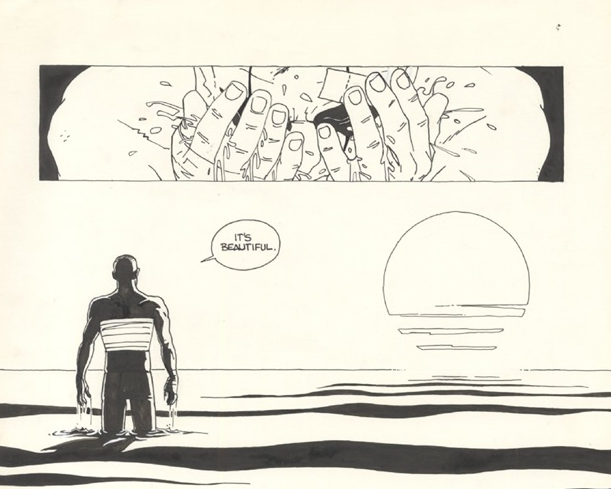 Written by Yuki Urushibara
Written by Yuki UrushibaraIllustrated by Yuki Urushibara
Del Rey
Ginko, our wandering Mushishi, goes everywhere from a Mushi-infested mountain to the inner depths of a prison library in this second volume of exploits involving creatures that are all around us, whether we like it or not. Armed only with his experience, a few tools, and a pack of cigarettes, Ginko tries to make the lives of those affected by mushi a bit better--if he can.
Mushshi is the selected title for the third edition of the Manga Movable Feast, (or MMF) where those of us who hang out together in the blogosphere pick a title to talk about all at the same time. Perspectives and approaches will differ, which is part of the fun.
You can see the home page for the Mushshi MMF here.
In my case, this is a new series for me, so I'll be featuring my volume by volume reviews this week. You can go back to volume one here.
I liked the first trade well enough to actually purchase volume two, because I like horror stories in general, and atmospheric horror, such as Mushishi, is rare in a modern book (at least in my experience) and especially in comics both western and eastern. There's a need in most horror works to hit the gore button if things aren't moving fast enough, and Urushibara strays away from that.
If I had to guess, that's one of the things that would most divide a reader or turn them off Mushishi. After reading this volume, it's clear that this series is never going to feature big actions scenes or unimaginable mushi horrors, unless it takes a major turn later on in the series. For a lot of people, stories must get to their point quickly and the payoff--especially in a series with supernatural elements--must be big.
Mushishi features neither of those things. The opening story finds a man controlling the mushi of a mountain, to great personal peril. As Ginko investigates, he finds the situation far more complex than he expects it to be. The other mushishi's decision, based on his belief in a tragic fate, harkens back more to the works of Poe than to any modern master of the macabre.
I liked the creepy nature of the tale, and the idea that our protagonist often cannot fix the problems in the way that he wishes to (see also the last story in this volume) is a theme that reminds the reader that sometimes, there's no way to change a bad situation, no matter what you know or what you do.
Some folks don't like reading stories that work that way, and if you are that type of person, this series is not for you. When Ginko visits a library of mushi knowledge and almost unleashes a horde of evil mushi, you're not going to get a big battle scene. (You will, however, get a great series of panels that book geeks will likely ooh and ahh over!) The solution is far less dramatic, a lot more restrained, and fitting within the context of this ghostly, timeless world that Ginko wanders.
One group of people who might like to check this out are those who like Vertgo's Hellblazer. I mentioned in Volume 1's review that Ginko is a dead ringer for John Constantine, right down to having a nasty habit of having bad things gets worse when he shows up. The violence is definitely scaled down, but if your main reason for reading the Vertigo series is to see what types of supernatural adventures John gets himself into, this might appeal to you.
Though I do like Mushishi, it does have a bad habit of starting the volumes with the weakest entries. The opening story is the weakest in this trade (again), a pattern that's rather puzzling to me because there's nothing in the stories themselves that would be impacted by reorganizing them. The mountain man was okay, but if I had just been paging through, it's unlikely that would have sold me on the concept.
The best story in this volume is the one about the man who chases rainbows. I'm used to seeing rainbows in a western perspective complete with little men. The idea that chasing rainbows is universal really appealed to me, and the ending was perfect. I'd have led off with it instead. It also moves a bit faster than some of the other stories I've read so far.
I mentioned in the review of the first trade that Urushibara tends to let the stories meander a bit. That was true yet again for the first story, but I thought she had things about right after that one. The story of the girl who died and resurrected herself every day had just enough action to balance the slower parts, for example. (It also features a great commentary on human nature that I won't spoil here.) You're never going to read Mushishi at a breakneck pace, but I was glad to see the pacing picked up a bit. I'll be interested to see how that goes in future volumes.
Another change is in the nature of the mushi we encounter. While the first volume spotlighted mushi that could be rationally explained, this time we're facing ones who create conditions that cannot occur in nature, or at least not easily. I kinda liked the idea of being able to explain mushi away in an X-Files sort of way, so the change was a bit disappointing for me. This might just be a passing phase, though, since the stories have no real connection to each other.
Mushishi is not for everyone. I think you have to have a thing for older literature to appreciate the style tat Urushibara is going for, and if you found your Victorian Lit class boring or think that Friday the 13th is a tame movie, then you probably should look elsewhere. Those with an appreciation for the older approach to terror will find much to enjoy, however. This is a series that I definitely think is worth checking out, but be aware it may not appeal to you.







